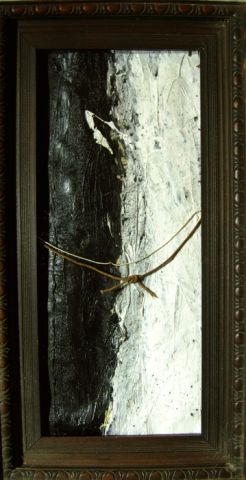I often see mentioned the failure of Post-Modernism to connect with history. I pay attention to that. To be outside of history is to be lost, ungrounded.
In my own work I have striven to relate to history; place myself in dialog with it. And while, it can be exciting for me as I create, I won’t deny feeling unnerved when I compare my work to the contemporary market. I can see that my work looks different. I tell myself this is a good thing but it doesn’t relieve my fear.
My work clearly is dialoging with Abstract Expressionism, the gestural abstraction is unmistakable. The concept behind the work is where the debate changes. I use gesture to recall the body in time. This places the body in relation to outside forces such as chance and imperfection. This relationship explores the impossibility of the self to relate absolutely to itself. Therefore it realizes the paradox that the self resides in context but is also obliterated by that same context.
In my work the flattened plane and the ‘all-over’ composition is replaced by spatiality and isolated elements. Bold defiance is replaced with temporal insolidity. There is a feeling that at any moment if we look again, the whole scene will have shifted and changed. The forceful elements will have lost ground, be under threat, be consumed.
The self has a confident presence in my work but it is a presence which is tenuous, momentary. It is a presence which knows it only has a moment. The self in my reinterpretation holds its inner continuity, but sees the articulation of its presence as fleeting and so absolute relation to itself an impossibility.
I, for one, am ready to move on from Post-Modernism. How about a shift into ‘Temporalism’? It has a nice ring to it.

